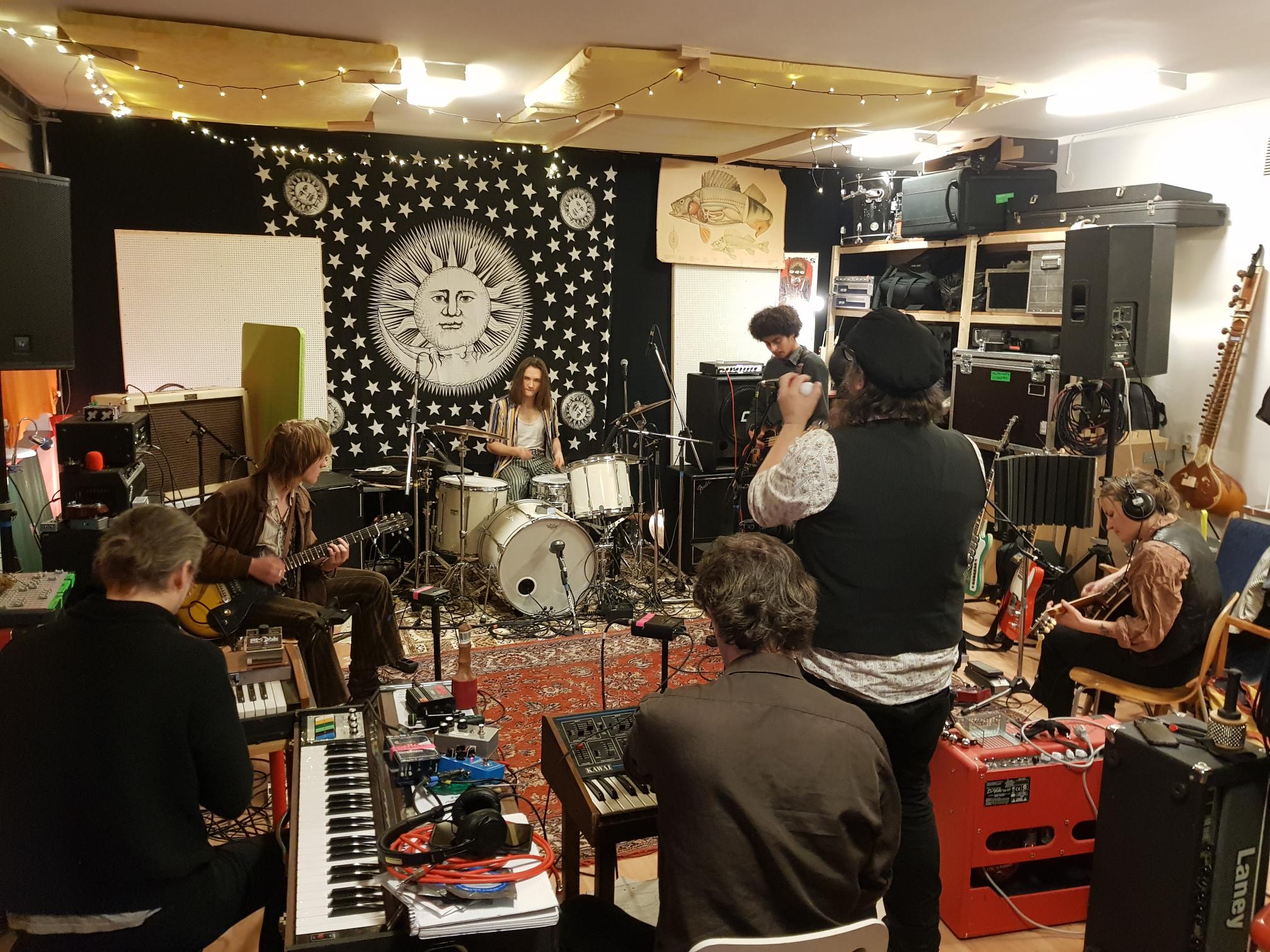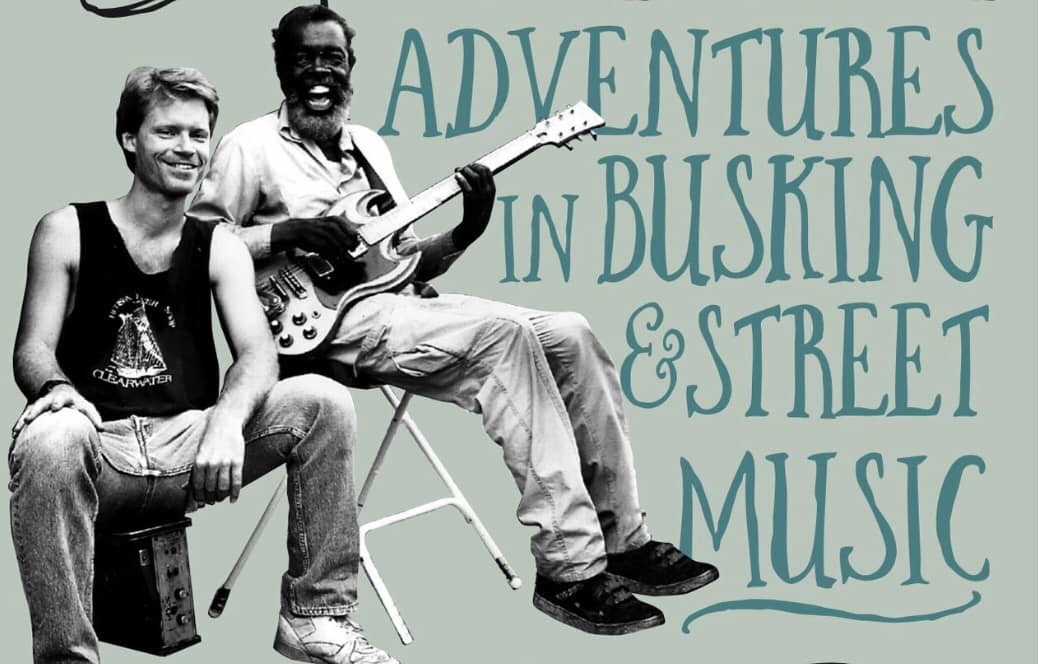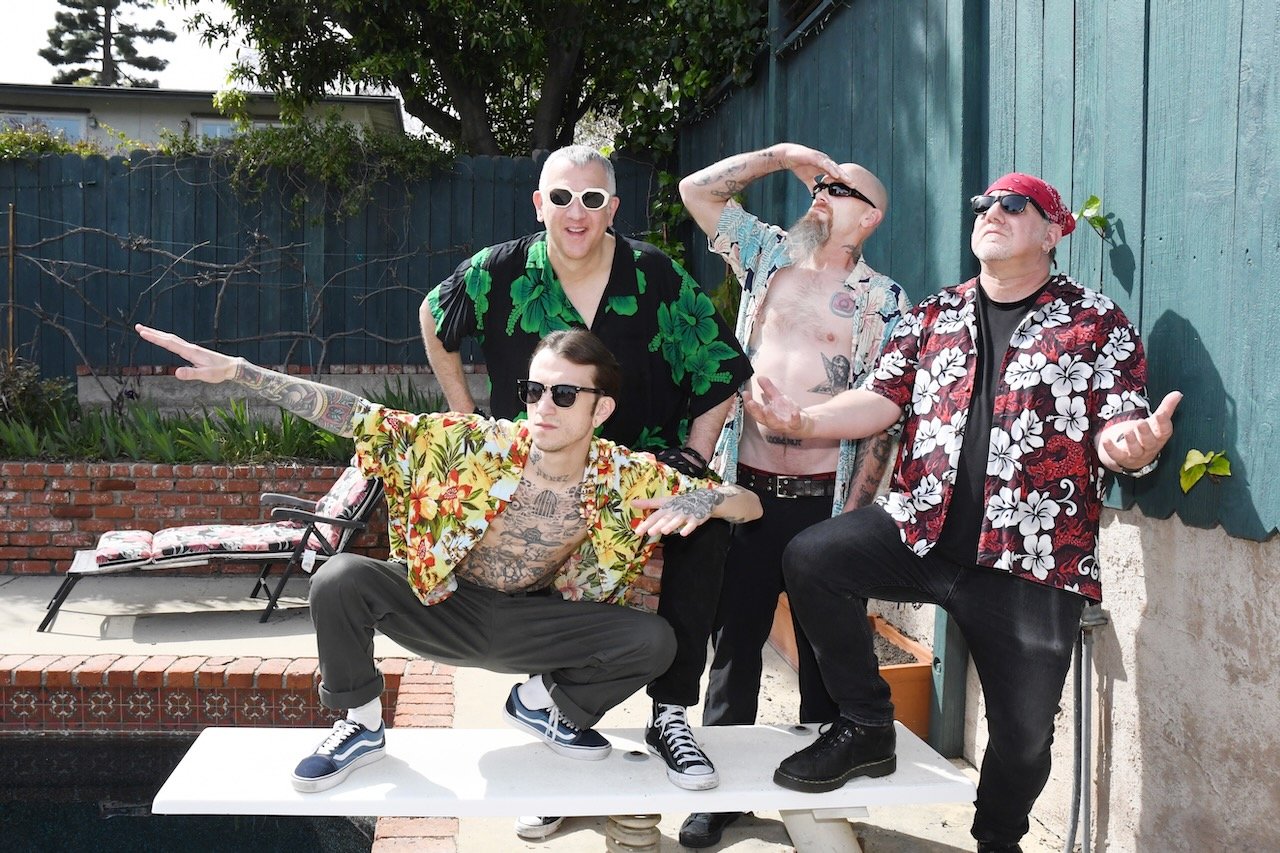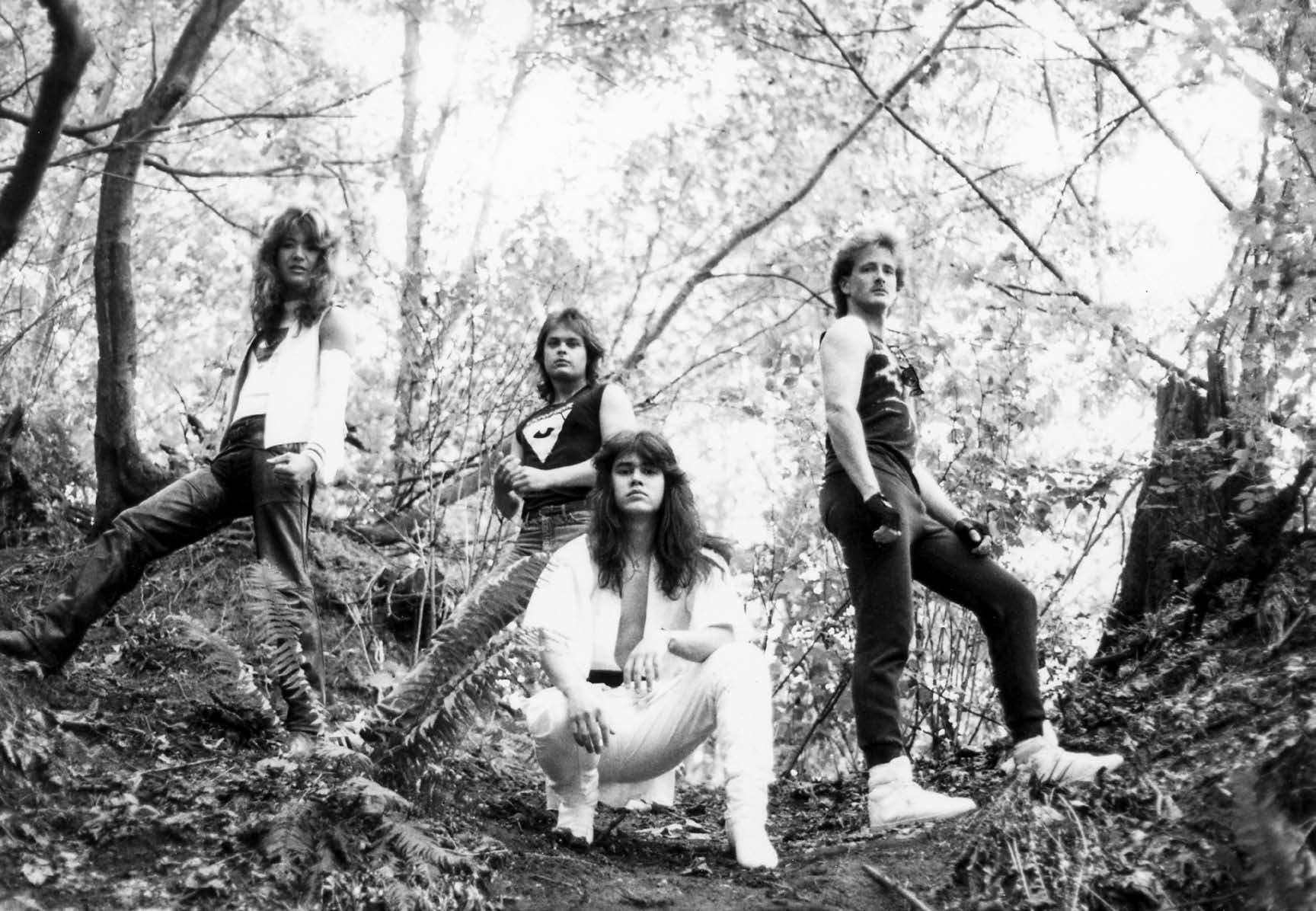Bangladeth | Interview | Spontaneous Psych Rituals behind ‘Versus’ on Svensk Psych Aften
The very mysterious Bangladeth is a collective—or, more accurately, a gathering of like-minded individuals brought together by a shared love for the underground. Think ‘Yeti’ by Amon Düül II, the raw, tribal energy of early Hawkwind, and that special, magic that happens when minds converge and let loose.
Their debut album, ‘Versus,’ captures that unfiltered underground spirit with a sense of spontaneity that’s impossible to replicate. There’s no rehearsing, no planning—each track feels like it was born in the moment, crafted from the collision of pure energy. Bangladeth, in its essence, isn’t really a band. It’s a gathering of people who, in just a few days, each prepared sounds, riffs, and lyrics. No one knew what the others would bring—so, no rehearsals. They met up in a rehearsal space, and the music came together largely through improvisation. Svengali (Sven), who runs the excellent Svensk Psych Aften label, was asked just two days before the meeting if he could write some lyrics. He wrote three, but no one knew what they were until he arrived at the space (where he knew only three of the eight people in the room). He read his lyrics, explained his ideas for the sound, and then they recorded. It was all done on the fly—pure soul, pure feeling, with nothing but the moment to guide them. The result is a record that feels alive, untamed, and as if it could only exist in that exact place, at that exact time. As the late great Ram Dass would preach, “Be here now.”
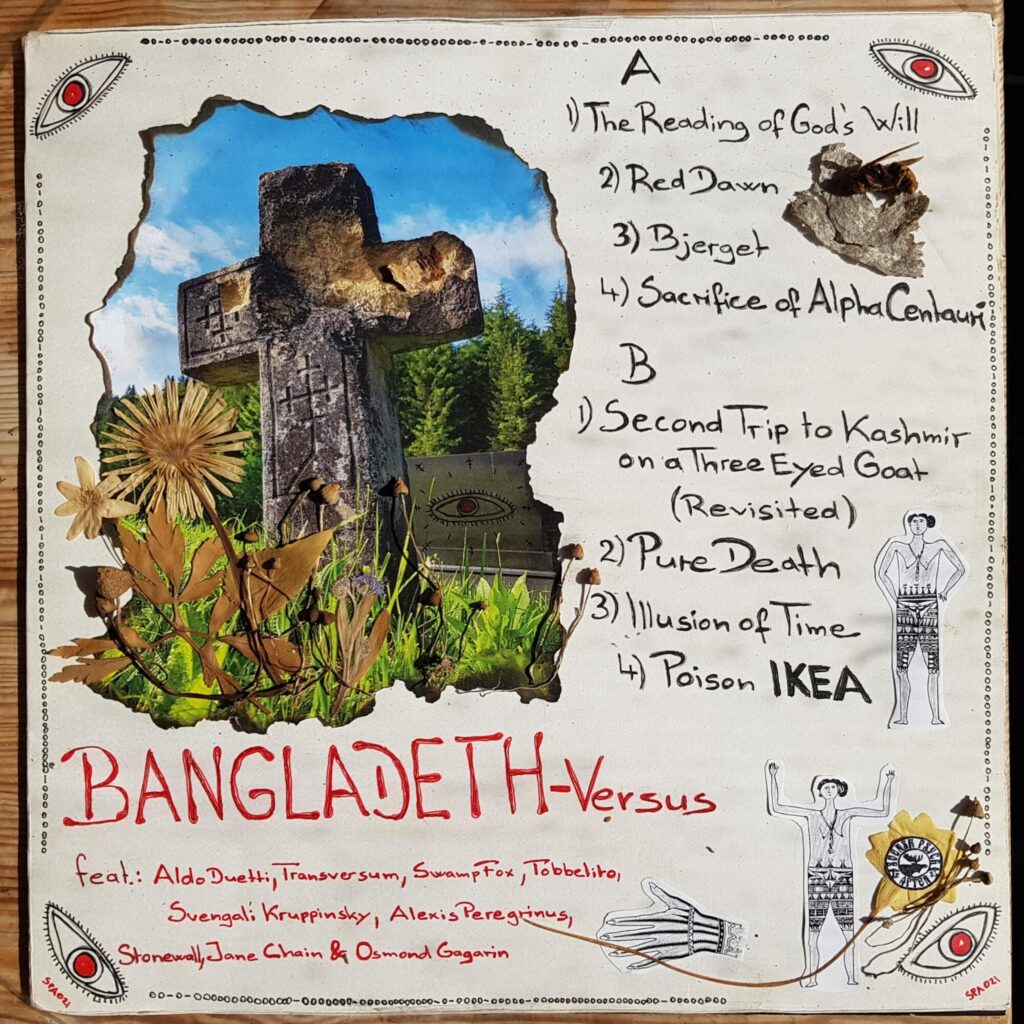
“It’s Hawkwind and Amon Düül II’s ‘Yeti’ that summarize essential inspiration.”
Thank you for taking the time. I would love to hear about where you grew up and what eventually led you to become interested in music, and later on, into the more experimental territories that you’re currently exploring.
Svengali (Sven): I was born in the DDR in 1970. In 1981, we moved to the little island of Fanø on the west coast of Denmark. For the last 30 years, I’ve lived in Copenhagen and recently in a little house in the Swedish forest with my partner and dog.
Music has always been a part of my life. I grew up with my parents’ Amiga record collection—Elvis, Demis Roussos, Abba, The Rubettes, Beatles, Puhdys, Rolling Stones, Mireille Mathieu, Karel Gott, Queen, etc. When I got my first tape recorder, I would sit in front of the TV and record songs from the West German pop shows like Hitparade and DISCO with Ilja Richter. Those were the musical highlights of the month! I’d ask my family to be quiet, hold the tape recorder close to the TV, hit record, then stop, rewind, and erase any nonsense before the song ended—ready for the next one. I loved those Saturdays, and both shows opened my ears a lot.
When we moved to Fanø, I got a newspaper route, and as soon as I could afford it, I bought a stereo system with double tape, radio, and record player. On Fanø, I was introduced to blues and metal, bands like Judas Priest, Accept, AC/DC, Iron Maiden, Saxon, Mercyful Fate, and eventually ‘Fugazi’ by Marillion—still love it. As a teenager, I started trading tapes, and a lot of the new music I found on them was stuff nobody on Fanø was really interested in, so I knew I had to move to Copenhagen as soon as possible. In the mid-’90s, I started working for Roskilde Festival (mainly building backstage areas and helping in the early days of the camping stage, which began with just a van, equipment, and a band, but has since grown to a four-day pre-festival).
Nowadays, I help out at the Festival of Endless Gratitude, building and driving artists to and from the airport. In 2012, I got to hang out with the legendary Hans Joachim Roedelius during FoEG. We connected over our East German heritage and had some great conversations about life and music. Copenhagen was the epicenter of underground live music in Denmark in the ’90s and maybe still is. From fall until spring, I went to live shows up to five times a week and found my group of like-minded weirdos, mainly in little DIY venues like Mayhem, Daemonens Port, and Dragens Hule (most of them are gentrified and gone) or at places like Loppen, Stengade 30, Rust, and Ungdomshuset.
Transversum (Helena): I grew up in the countryside near the west coast of Sweden. I’m educated in fine arts with a focus on sound art and performance. I started out playing the typewriter alone as a text-performance with sound. Later, I developed my first collaborative projects, like my electric typewriter duo “100110.” We put contact microphones on the typewriters and added a bunch of effect pedals. Our music could be described as a slow form of techno, and it was once compared to the ambient soundscapes of composer William Basinski by The Washington Post when we played at the Sonic Circuits festival in 2014.
I also had a trio called Triumph Adler (the name of the typewriter) where I played the typewriter, and the other two used accordion and voice. Lately, I’ve been doing solo projects with atmospheric ambient drones using organ, electric guitar, banjo, and electronics, as well as collaborations like Bangladeth, where I use the tenor banjo.
William: I grew up in Angola, Africa, and moved to Malmö, Sweden, when I was two years old. Music like kizomba, reggae, funk, and blues has been with me since I was little. These different sounds, combined with my brother’s passion for metal and rock music, made me want to create my own sounds, though I didn’t act on it until many years later. When I was 15, my brother showed me Pink Floyd, and after that moment, I finally decided to channel my ideas into the guitar.
Glenn (Jane Chain): I grew up in a small town near Malmö, Sweden. When I was around ten, I figured out that I liked hard rock and metal—I loved the heavy, intense sound of AC/DC and Black Sabbath. My biggest love became Deep Purple, and their first three LPs also got me curious about psychedelic rock. That, in turn, led me to Hawkwind, which I discovered around 1985 when I was 13. I’ve stayed a devoted Hawkfan ever since.
What were some of the first bands or projects you were a part of? Can you share some more about them?
Svengali (Sven): I don’t play any instruments and never really had any wish or intention to (I tried harmonica for a little while because my granny played, but I got bored and lost interest), so I don’t see myself as a musician. The first time I was asked to be a part of a song was when my friends in the Swedish band Hills asked me to translate some Buddhist verses by the Tibetan master, yogi, and poet Milarepa into German and recite them for the track ‘National Drone’ on their masterpiece ‘Frid,’ released by Rocket Recordings. What an honor. I performed my vocal part with the Hills gang on stages in Copenhagen, Malmö, Göteborg, Oslo Psych Fest, Roadburn in Tillburg, Liverpool Psych Fest… Great times. Haha, I also played subsonic cones and vibraphone with Agusa in the hippie commune Thy-lejren. Since then, I’ve participated with words and theremin on the ‘Mina Ögon’ LP by Sveriges Kommuner & Landsting, did some space reciting (a message to ground control from my childhood hero cosmonaut Sigmund Jähn) on the track ‘Salyut 6’ on the ‘Space is Cold’ LP by Rymdstyrelsen, and did vocals and noises with some old friends in a great weirdo band called Älgarna Från Värmland, along with a couple of other projects—some of them on the LSD Lullabies LP. I also cooked for my friends in Spids Nögenhat while they recorded the Danish psych masterpiece ‘Kommer med Fred’ (Bad Afro Records) during an intense weekend at Black Tornado Studio in Copenhagen. Their record was later voted as the best Danish rock album of the last 10 years, and I agree.
William: The first band/project I was involved in was Bangladeth, which started as a recording session with a bunch of people, most of whom I’d never met before. We spent a few hours in the studio and quickly noticed that we all got along very well, both musically and socially.
Magnus (Aldo Duetti): Texas Motherfuckers.
Glenn (Jane Chain): I met my current fellow Bangladeth guitarist, Magnus Larsson, in the late ’80s. He had already been playing guitar for a couple of years and got me hooked on the idea of actually starting to handle an instrument on my own. A fellow musician offered me an analog monosynth in exchange for a 20-pack of snus, and I’ve stuck to analog keyboards ever since.
What led to the formation of Bangladeth? Do you feel you work under certain concepts or ideas, or is it more of a free-flowing project?
Magnus (Aldo Duetti): The opportunity for all these people to come together.
Glenn (Jane Chain): Magnus asked me if I wanted to come along for a jam, presenting it as a space rock/kraut/Amon Düül II-ish event. I happily accepted. Little did we know that the ensuing recording would lead to a festival gig. Having experienced that, I think we’re all motivated to take further steps.
Tell us about the instruments you’re using.
Svengali (Sven): Mainly voice…
Transversum (Helena): I use banjo because I like to work with unexpected instruments, and I also love its sound. When I play solo, I use different kinds of instruments, but I don’t normally use them in the expected way. I try to get to their soul—just like the devil does.
William: I am playing an all-black Fender Telecaster MIK 1988 with an ashwood neck, all original parts!
Magnus (Aldo Duetti): Epiphone Olympic 1961. Pedals: Small Stone Phaser, TC Electronics Flashback. Amp: Fender Blues Deluxe. Engineering & mixing.
Glenn (Jane Chain): I’m handling Magnus’ small Kawai 1970s monosynth, enhanced with a delay effect. I use it to fill out the bass sound in parts, lay down Moog-ish melodies at times, and add some space effects similar to what Dik Mik used to do with Hawkwind.
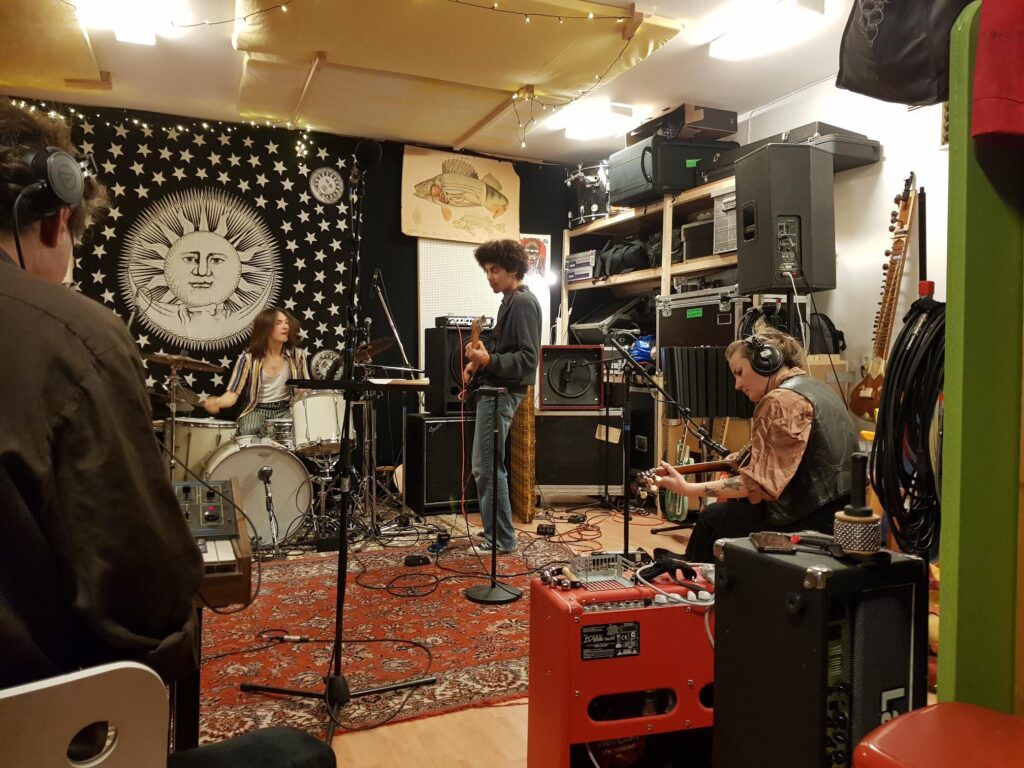
‘Versus’ is truly a stunning record. Could you shed some light on the recording process and how everything came together to result in such a fantastic release?
Svengali (Sven): Thank you! Well, I visited my old friend Tobbe at his workplace, and he told me he had a new psychedelic space project with a friend called Bangladeath… but most of the people he didn’t know yet, and the gathering would be in two days. He asked if I could write some words for two or three tracks. I didn’t really like the band name, but since it was a psychedelic, spacey jam, I agreed to give it a try and stop by the rehearsal space on Saturday with my ideas. So Saturday comes, and within 30 minutes in this room, I felt a great communal vibe where everyone was equal and shared ideas, riffs, drum fills, synth sounds, and repetition-repetition-repetition. Already as I walked back to the cave, I could feel in my bones that we had created something special. Then came the recordings, and I was happy as a lark. So I said SPA [Svensk Psych Aften] would release it if I could change the name to Bangladeth instead. I went to the forest, worked on the sleeve, labels, and insert, named the beast ‘Versus,’ and released it in December 2023.
Tobbelito (Tobbelito): In January 2023, we had a few ideas and felt like trying them out with new people. We contacted people we thought would be able to contribute and set a date for a jam session. A total of nine people came and went throughout the day, and we recorded everything we played. Afterwards, we were quite surprised with what we had accomplished. The “best” way to salvage anything would have been to listen closely to the material and use the best parts to make songs. Instead, we decided to make a rough mix with no overdubs. Danish label Svensk Psych Aften liked what had been done in that small rehearsal room and released it on vinyl in 250 copies.
Glenn (Jane Chain): It’s a collaboration and teamwork involving seven great artists and musicians, plus me. My part is modest, and I’m grateful to be part of it, but honestly – the LP is the result of a lengthy jamming session. I think a great part of the inspiration comes from the presence of three young musicians, who make the rest of us up our game considerably.
Are you planning to record more in the near future?
William: I am planning on recording a solo EP in the future, though I’m not sure when at this moment. The genre will probably be a blend of psych and soul.
Glenn (Jane Chain): Following the success at Psykstämman, I wouldn’t be surprised to hear about such plans. On the other hand, whatever is a great experience the first time around should generally not be copied. There will be new psychedelic endeavors; under which label is written in the galaxies.
Do you perform concerts as well?
Svengali (Sven): I’m answering these questions in a van, on our way with Bangladeth to the little island Brännö in the Gothenburg Archipelago. I remember that I had shipped a handful of ‘Versus’ to Gothenburg. One of the buyers was Axel, who played the record for his friends. This bunch of psykonauts arranged a two-day festival called Psykstämman (feat. URAN, Flowers Must Die, Dungen, VårtSolsystem/Our Solar System, Les Big Byrd, Græns, etc.), and Axel contacted SPA asking if Bangladeth would be interested in performing. With only a few copies of the LP in this part of Sweden and ‘Versus’ existing only on LP (not on Bandcamp, streaming sites, CD, etc.), I wondered who would come to listen to us. But the more I thought about the invitation, the more it sounded like a nice challenge. I asked the collective, and everyone wanted to do it. So, instead of a single gathering one year ago with these creative people, we were now asked to perform as a band. We did a few rehearsals and headed to Psykstämman… and we had a great time. Thanks again to the whole Psykstämman crew.
Glenn (Jane Chain): We hadn’t, until this past weekend. It went down so well, however, that I believe we will make further attempts now that we’re at it.
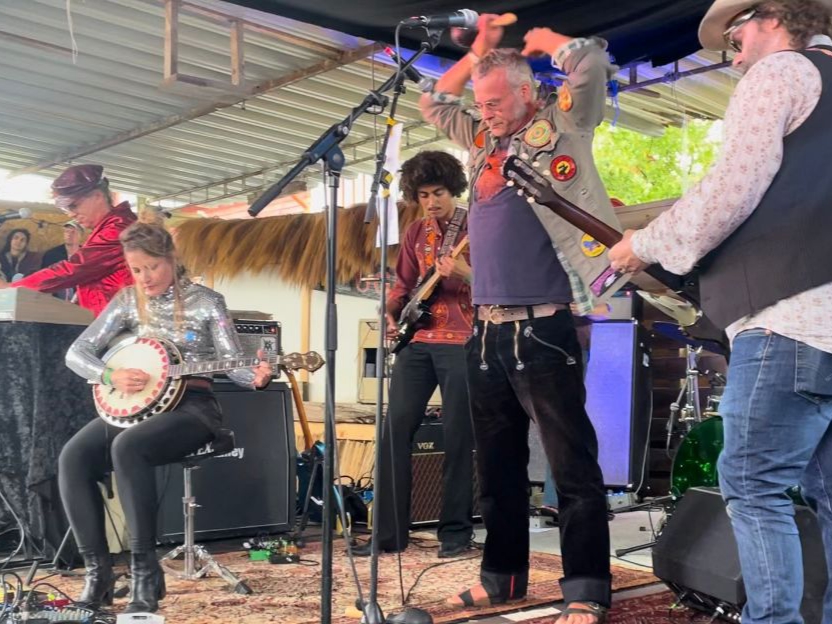
What about your influences? Are you influenced by specific artists or bands, or is it a culmination of various influences?
Svengali (Sven): I don’t really know about a specific influence… if anything, then maybe Captain Beefheart. Besides my closest friends and my flock in the forest, music is very much the essence of my daily life—it’s there for relaxation, work, therapy, and energy. I listen to a lot of music every day; for every mood, there is music or sounds.
William: I am heavily influenced by guitarists such as Rory Gallagher, Reine Fiske, and Steve Howe.
Glenn (Jane Chain): For me personally, it’s Hawkwind and Amon Düül II’s ‘Yeti’ that summarize essential inspiration. Adding to that, ’60s garage/psych and early hard rock, along with the Krautrock scene, is my natural musical environment.
I’d like to share a quote from Peter Brötzmann. In an interview, when asked about parallels between painting and music, he remarked: “[…] if you play music, it’s out in the clouds and you can’t take it back, and usually you do it together with at least one more person. Working in the studio (alone) on canvas or paper or whatever, you can always put the result into the garbage or stuff it into the oven, and it never has existed. You start from the beginning.” What are your thoughts on this perspective?
Svengali (Sven): Hmmm, a nihilistic way of thinking. Interesting perspective though, but I don’t agree.
Glenn (Jane Chain): Performing live represents the essence of musical engagement to me. Everything else—rehearsing, recording, producing, writing, etc.—is just the pretext. The reason I prefer the music mentioned in reply 8 is, partially at least, that it’s created with a pretty much “live” attitude, even when we’re dealing with studio recordings. One of the greatest moments in music, to me, is the second LP of Amon Düül II’s ‘Yeti,’ which contains three improvisations. While I don’t reject the idea of organized song-making, I think the jamming part is where the real movement takes place.
“I like to keep things as analog as possible”
I’d love to hear about the Svensk Psych Aften label. What initiated the idea?
Svengali (Sven): Well, it all started when I heard the first Hills record. I think I ordered it from Aquarius Records in San Francisco. I was drawn in by the sleeve art and description, and when I received the LP, it just landed and grew inside me… the bells in the beginning, and then BANG. During a music and beer evening, I played it for Tobbe, and he introduced me to Flowers Must Die.
I immediately imagined a DIY evening with great music, cheap beers and entrance, oil projectors, etc., surrounded by friends and foes who like music from the other side of the pond, i.e., Öresund. So, I invited both bands and Sveriges kommuner & landsting for a Swedish psych night in Copenhagen. It was a success—not financially, but the vibe was just as I had hoped.
The next Swedish psych night was at the new Ungdomshus with Huggorm, SKL, and Anders Stub & Hans Psykedeliska Undervattensorkester. When Anders Stub was ready with his third solo record, ‘Sadness Be Gone,’ in 2014, Svensk Psych Aften became a label and released his new LP along with Tobbe, who was the head honcho of the legendary Malmö label Kommun2. For our second joint release, I convinced Tobbe to re-release ‘For Sardines Space Is No Problem’ by The Movements (originally released on CD by Sulatron). It’s a kind of space-rock concept album about the Swedish astronaut Christer Fuglsang. We did several K2/SPA LPs over the following years.
I like to keep things as analog as possible—about two releases a year. I enjoy creating sleeves and inserts while chilling in our cabin in the Swedish forest.
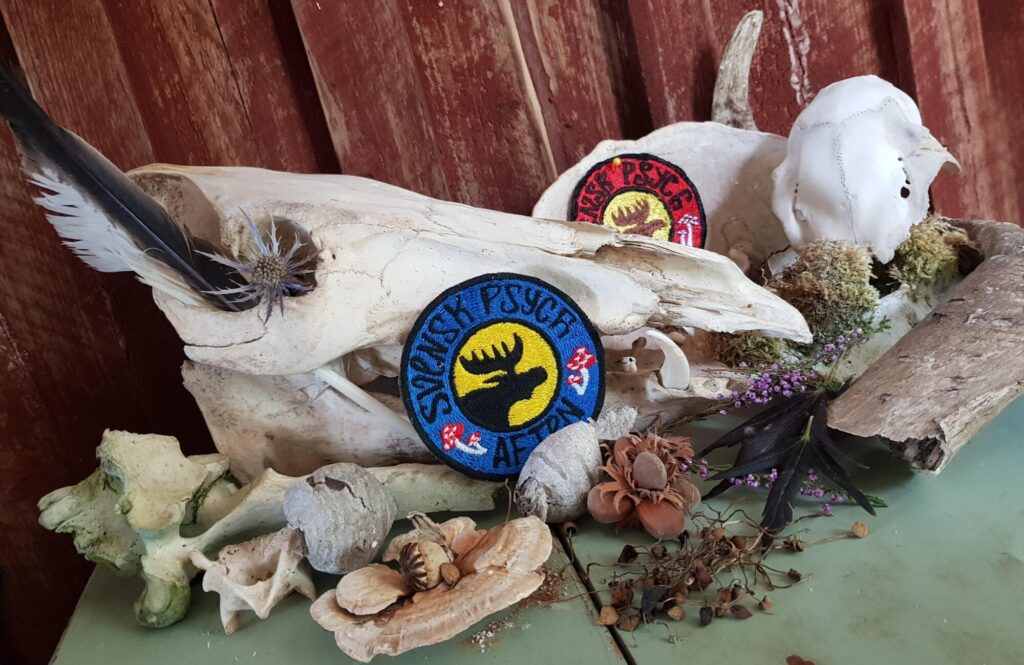
It seems that you’re picking artists that have a certain vibe or atmosphere.
Svengali (Sven): ‘Spacerock’ by Rymdstyrelsen, The Movements, and Måneskjold; doompunk by Alucarda; heavy and slow doom by GAIA and Drukner; sludge by Slowjoint; pop punk by Deadringer; loner psych by Anders Stub; weird garage psych by Älgarna från Värmland; instrumental forest psych by Vårt Solsystem; experimental psych by Naturale… hmm, yeah, a space, repetition, meditation, earthy kind of label.
What are some of the most exciting projects for the label?
Svengali (Sven): Following the creation of ‘För Meditation’ by Centrum while traveling in India, and how the tracks developed and grew into this masterpiece… and the creation of GÅS: ‘Vol.1’ LP while working on the sleeve, insert, and labels in the forest. Pure magic. Oh yes, and doing the artwork for the inside gatefold sleeve for Frid’s re-release on Rocket Recordings. And the connection with all these fine artists SPA has worked with over the last 10 years—some have become really close friends.
What are your future plans?
Svengali (Sven): The next new SPA release will probably be the result of a rehearsal/jam evening with Moundabout and Sunburned Hand of the Man. Moundabout went on a short tour to the US, and Paddy sent me this jam while I was in the forest, just with my dog Ninna. I probably listened to it a handful of times that day. After the third listen, I wrote to Paddy that I would love to release this jam. He immediately answered: “Thought you’d like it, brother… I’ll speak to Sunburned.” But in general, I don’t really make long-term plans. Good stuff comes when good stuff comes.
William: My future plans aren’t very thought out at the moment, because I just graduated two months ago… but I’m sure that someday I want to make a living through playing music!
Who are some of the most important players that influenced your own style, and what particular elements of their playing did you admire?
William: As mentioned before, Rory Gallagher. His blend of traditional blues rock and Irish folk music was incredibly satisfying to my ears. Rory’s solo on ‘What’s Going On’ by Taste is a perfect example of the style that really captured me.
Glenn (Jane Chain): I don’t really have individual musicians as a source of inspiration (apart from Dik Mik, perhaps!), but if I had to name one who’s meant a lot, it’d have to be Hawkwind-era Lemmy.
Let’s end this interview with some of your favorite albums. Have you found anything new lately that you would like to recommend to our readers?
Svengali (Sven): My all-time favorites are the first six Black Sabbath albums, with ‘Sabbath Bloody Sabbath’ probably in first place, and ‘Safe as Milk’ by Captain Beefheart and His Magic Band, which is the record I listen to most frequently.
At the moment, I’m listening a lot to various Bardo Pond records, Henri Texier’s ‘Amir,’ ‘Dog in the Sand’ by Frank Black and the Catholics, ‘Ptooff!’ by The Deviants, ‘Armchair Boogie’ by Michael Hurley, ‘Sånger’ by Thomas Mera Gartz, ‘Sisterworld’ by Liars, ‘Escalator’ by Sam Gopal, ‘Swans Are Dead: Live 95–97’ by Swans, ‘The Sophtware Slump’ by Grandaddy, ‘The Magic Fire Music’ by JOMF, and some newer stuff like ‘Lives Outgrown’ by Beth Gibbons, ‘Ballet of Apes’ by Brigid Dawson and the Mothers Network, ‘Spot Land’ by Gnod, and ‘Henki’ by Richard Dawson & Circle.
Glenn (Jane Chain): ‘Space Ritual’ by Hawkwind and ‘Yeti’ by Amon Düül II are two essential releases for me. There’s so much amazing music from around 1965 to 1975 that I’m still discovering new treasures.
As for contemporary bands, I’m generally less impressed, but here are a few that resonate with me from very different genres: Kadavar, Zmei3, Siena Roots, Hällas, and Jess & the Ancient Ones. A local Malmö garage-psych band that I’d highly recommend is Paranoia.
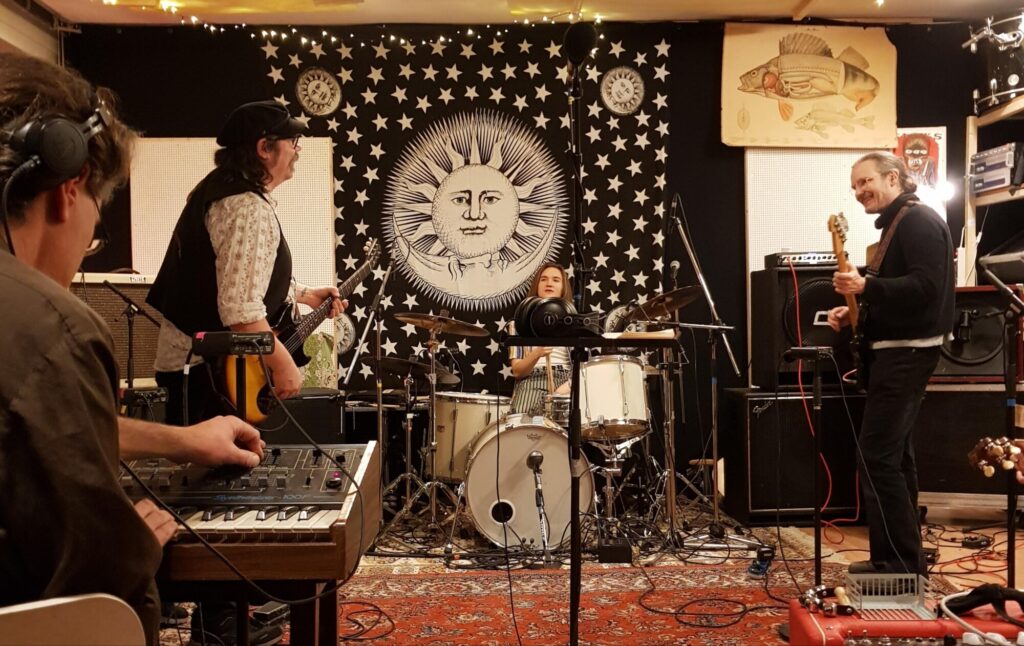
Thank you for your time. The last word is yours.
Svengali (Sven): First, thank you for the invitation and for your work with It’s Psychedelic Baby Magazine. Well, enjoy nature and life, listen to dub on Sundays, and, in the end, a quote from ‘National Drone’ by Hills: “Allt det vi jagar, finns redan här” (All that we chase is already here).
Glenn (Jane Chain): Thank you for showing interest in our project! I think our time is quite promising for psychedelic rock and other experimental/alternative genres. A lot of pioneers’ work has been made accessible to everyone via streaming and digital releases, many second-generation psych rockers (such as myself) are still active and may even sense a growing interest, small niche festivals have become a normality and can be set up with relatively small investments, and, last but not least, very young musicians are also finding their way into this subculture and contributing to its rejuvenation. The future looks a lot brighter than it did when I first started playing!
Klemen Breznikar
Headline photo: Bangladeth recording session in Malmö (January 2023)
Svensk Psych Aften Facebook / Instagram

